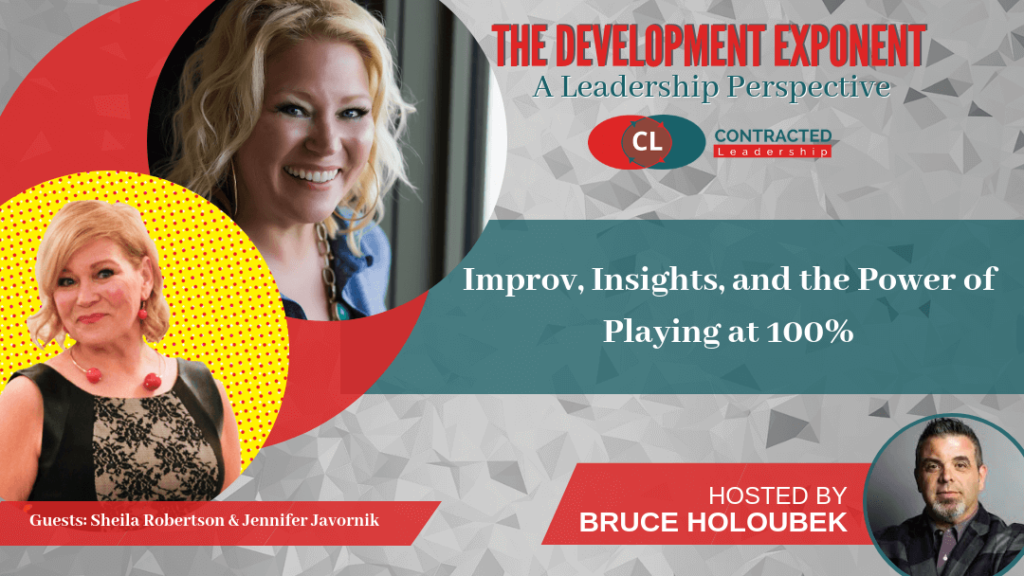
What a delight it was to have two special guests, Jennifer Javornik, and Sheila Robertson on the show. Both business professionals and masters of improv, I was simultaneously wowed, entertained, and intrigued by the complete out of the box lessons they had to share.
When most people think “improv” – they’re usually picturing dark theatre, minimal stage, wacky antics, and maybe cocktails with friends. What they don’t often think of is leadership, sales, business connectivity, productivity, problem-solving, or networking. That’s where I can say for a fact, they would be myopic. After spending an hour with these two witty and wonderful women, it’s easy to see how improv can sharpen all of those skills and a whole lot more.
What do masterful improv players and tremendous leaders have in common? #ExcellentListeningSkills Click To TweetAfter taking a sometimes amusing, sometimes fascinating, conversational journey to learn how these two both found themselves on the improv path and why, we learned so much about the practical business and life applications this spontaneous practice truly creates.
One improv “rule” that really stood out for me again and again during our time together was that you’ve have to play at 100%. To master improv (and most things worthwhile in life) – you can’t play small. You have to give yourself permission to just go for it. The results, when you do, may be absolute success – or ridiculous failure. Either way, it’s perfect, because you committed and gave it your all and there’s so much value in that.
The second “rule” is that you have to be completely present in the moment, which I believe matters as much in life and business as it does in improv. I found it enlightening to hear how so many of us are brought up to be analytical thinkers. We see a problem, then look at it critically, break it down, then try to determine a solution. That’s great – except when you are meant to work it out with other people. That’s when we kind of get stuck in our own means of solution-finding. We’re not REALLY listening to the other people because we’re preparing the next thing we’re going to say in our heads to justify our solution.
If you’re not fully present in the moment – you’re missing the moment. #bepresent #leadershipskills #listenfirst Click To TweetThat kind of thinking doesn’t work in improv. You really have to be in the moment because there’s so much rapid-fire change. It’s less cerebral and more instinctual. You’ve truly have to become an exceptional listener and open to react to whatever happens or is said next.
Now think about that in the context of a brainstorming session or team discussion to determine how to solve a challenge at work. Instead of controlling the outcome – what if you approached it much like an improv player and rather than tackling it solo, trusted that by creating space for everyone to take part in the conversation that a better solution will always be found together?
That’s exactly the kind of ah-ha moments improv “playshops” create. These improv alternatives to workshops for leadership, sales, and service teams put improvisational tools to work to create increased connectivity and productivity. I don’t know about you, but to me playshops sound way more exciting than workshops!
Here are the kinds of things participants learn:
- Communicate better
- Be in the moment
- Connect more effectively
- Listen at a different level
- Bring and build ideas as a group
- Say yes more often than no
- Get comfortable with failure
- Become open to taking on new roles and responsibilities
From a leadership perspective – bringing in training which can promote building skills such as the ones in the list above in such a safe, fun, interactive way should be on any company’s to-do list. Even two hours of improv training can be incredibly transformational for people, which has the ability to transform an organization in powerful ways.
Learn to say yes more than you say no and you open yourself, your relationships, and your business to an entire new spectrum of opportunities. #SayYes Click To TweetA couple of those really hit home for me. First the communication and connection pieces. Full disclosure – I shared with Jennifer and Sheila (and the world since I said it on the podcast) how when my wife and I were in marriage counseling, one of the things we did together was to take improv classes. It really does change the way you listen, react, and connect with one another. The process requires you to completely let down your guard, be all in, and 100% present. All three of those things, as you can imagine, can have a positive effect on a marriage!
On another personal note, they shared how improv skills can help caregivers for people with Alzheimer’s and dementia. How staying in the moment, and redirecting conversations based on what is said next creates a much simpler and way less stressful interaction with a patient. It goes against much of what caregivers are initially taught about “bringing a patient back to reality” – but makes so much more sense. I sure wish I had known that before my mom had passed. I think it would have made such a difference.
The two additional tools that shine from that list are saying yes more than saying no and becoming comfortable with failure. How often is our first response to opportunities, questions, challenges, and conversations – “No”? By saying yes, we are able to broaden our skills, our spectrum, our connections, and experiences. That’s brilliant on both a personal and a professional level.
Then there is getting comfortable with failure. That’s a game-changer. Like saying no first, when we only play it safe and do the things we know will result in a win or a positive, how much do we miss out on? I’d venture a whole lot.
I truly enjoyed this extraordinary conversation with two powerhouse women from the improv space. Far from just being good, solid fun – improv clearly provides profound lessons. I loved playing along and learning – as did my wife Coreyne who joined us for the last segment.
As always, I asked everyone their take-aways
- Next time you’re in a group, take a moment to really try on what it would feel like to acknowledge that whatever solution, idea, or practice the group comes up with is better than what an individual could create. Put some trust in it.
- Try to say yes more than no – internally and externally. Sometimes the no’s that are creating the real barriers in our lives are not just the ones we say to others, but rather the ones we say to ourselves.
- When we look at opportunities, we often see them through a lens of our expectation. Trust that when we don’t get what we expected – it’s for the better and meant to be.
I’m thrilled to have had the opportunity to learn so much from such fun, joyful, and insightful people. I hope you get as much from it as we did here at the studio! I’d recommend adding improv skills to any business professional. In fact, this conversation really makes me want to get back to it myself.
Now, the question is – how can you take these ideas and practices and put them to work in your organization? Let’s have that conversation!

